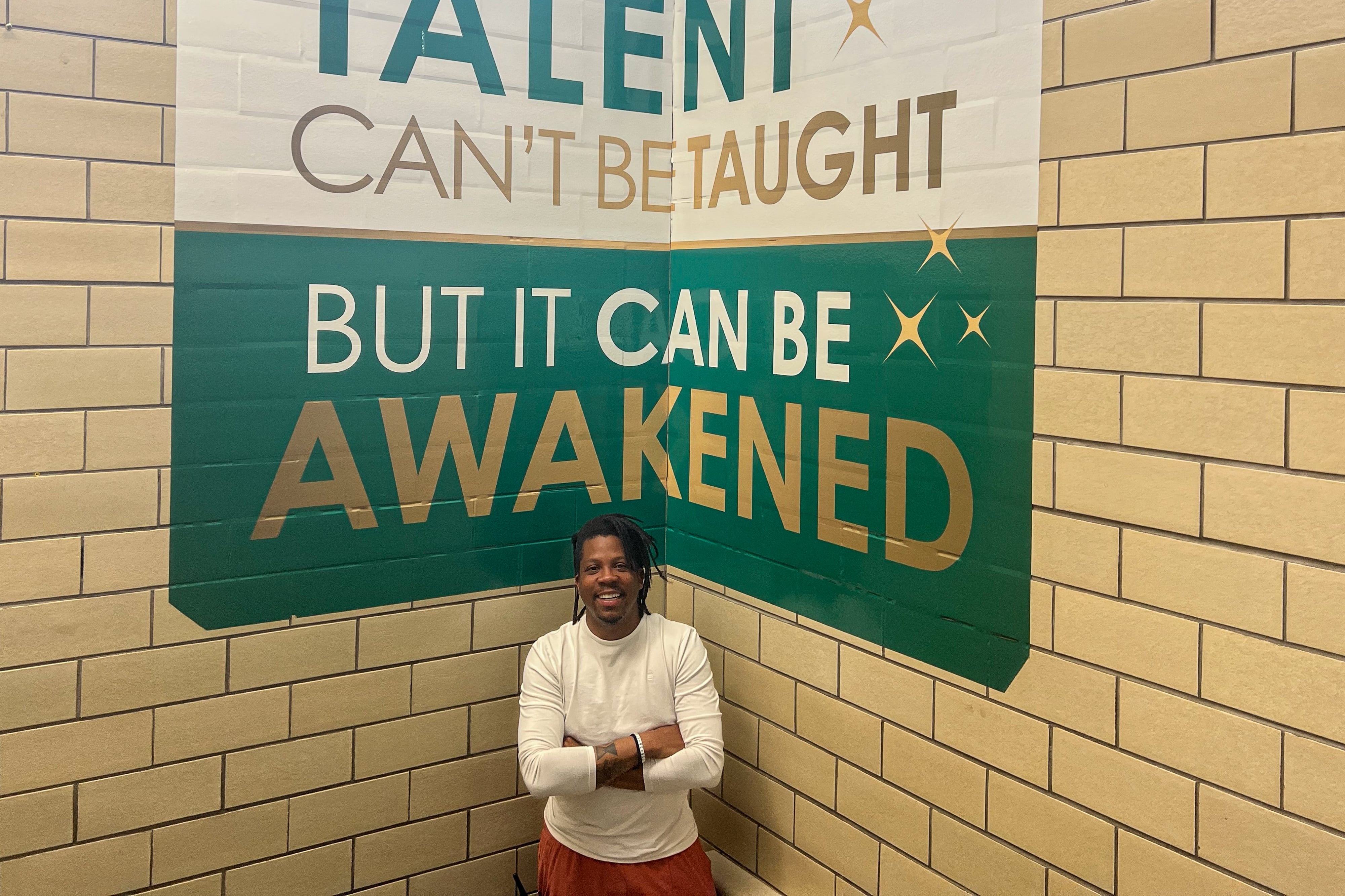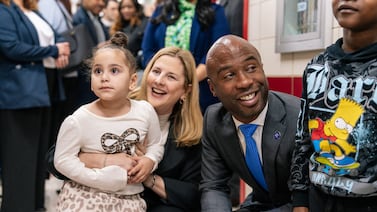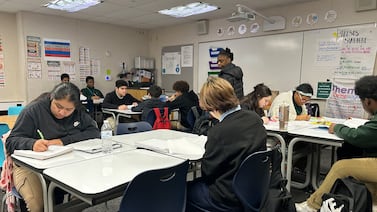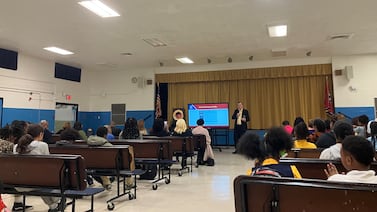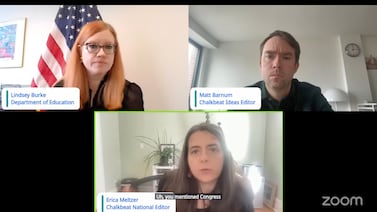Sheldon Reynolds never dreamed he’d become a principal like his father. But today, he leads a successful west Denver elementary school that six years ago was on the brink of closure.
In some ways, the biggest issues in education haven’t changed, said Reynolds, who talks about equity and innovation much as his father did decades ago.
“It’s infinite work,” said Reynolds, principal of the Center for Talent Development, formerly Greenlee Elementary School.
“I constantly have those conversations with my staff … even if we did fix everything, it’s just for that moment in time,” he said. “That’s why I still love working here. We’re still hungry.”
Reynolds, who also serves as a peer mentor for a handful of other Denver principals, was recently named the 2022 Colorado Outstanding Elementary Principal of the Year by the Colorado Association of School Executives and the Colorado Association of Elementary School Principals.
He talked to Chalkbeat about his approach to leadership, his vision for universal gifted and talented instruction, and his concern about a recent decision by the Denver school board to put new limits on innovation schools — district-run schools that can waive certain district policies, state laws, and parts of the teachers union contract.
This interview has been lightly edited for length and clarity.
What was your first education job and what sparked your interest in the field?
I was 19, and my first education job was as a program liaison in a summer school reading program that was a joint venture between AmeriCorps and Denver Public Schools. My father was a principal in the district, and I never thought that I would go down the educational path. However, my experience with kids in that summer program let me know the value and influence a young, male person of color could have. I switched my major from marketing to education when I got back to college that fall.
How did your own school experiences impact you and shape your approach as an educator?
I was blessed to have an amazing experience throughout every phase of my schooling. I performed well and had a cohort of peers from all walks of life that valued learning. I was able to watch my father navigate all the complexities of leading a school building, especially as an educator of color.
I think what has shaped me most is my desire to challenge the narrative that education does not work for BIPOC people. Looking across all the people I know, especially all the people of color that have a different life, education was the main common denominator. So, while I don’t think it was initially designed for us, we have benefited from it.
You became principal when Greenlee Elementary was in danger of closing. What were some of the first changes you made?
When I came to Greenlee, one of the first things I realized was that we had a talented group of teachers, leaders, and students in the building; however, their talents weren’t being harnessed. We reorganized the structure of the building to a more distributive leadership model. More than half our school serves in some type of leadership capacity. If I left this building, it would take years to undo the systems and structures we have in place. And that’s because it’s not just about me.
You’ve worked to address inequities in gifted education at your school. Tell us about your approach.
One of the limitations of gifted education is that screening assessments are biased against identifying students of color, second-language learners, and students that are economically disadvantaged. We created the talent development model to not only increase student identification but provide more substantial and frequent services as well. I knew that was just the first phase.
The real phase was to get to universal gifted teaching. So we’ve shifted to put more emphasis on universal gifted and talented instruction in all classrooms, versus spending the majority of our time trying to identify kids. We still work on identification because we know when students leave us, that title will mean something when they go into middle school. It’s going to open up classes for them in middle school, which will lead to opportunities in high school.
How do you think recent changes to the district’s policy on innovation schools will affect your school?
Ironically, the changes severely limit a lot of what my staff designed to make our workload sustainable. The limitations to calendar, compensation, direct placement, early hiring, and the alternative leadership structure are directly linked to the few flexibilities that remain, namely curriculum choice and professional development. Although we’re still able to create our innovative talent development programming and related professional development, the value of it is lost without all the supports needed to not make this work feel overwhelming.
You posted on social media that this policy change left you rethinking being a school leader in Denver Public Schools. Why?
Basically, this makes me question the value of working in a system where the school board can unilaterally act without talking to the educators or community that make up our district. I have great respect and working relationships throughout the district, from the central office to schools level, but there isn’t that mutual level of trust or respect towards our school board at the moment. Members of the board promised in public and private conversations that the new policy would not impact innovation schools beyond changes to teacher rights and due process. That turned out to be a lie.
Leading and working in public education in the times of COVID is hard enough. It’s worse when the people that have the most power make leadership decisions that disrupt learning and build mistrust in an organization where we all need to be working together. It’s a hard pill to swallow because I am a product of Denver Public Schools.
Does education look different at your school after two years of the pandemic? If so, how?
I don’t think education looks drastically different since the start of the pandemic. I tell my staff that 2020 didn’t really bring about any new problems but rather exposed issues that we in education were generally able to hide or ignore. I think the talent development model that we created during our initial turnaround was the right work then and continues to be the right work now.
Tell us about a memorable time — good or bad — when contact with a student’s family changed your perspective.
I’ve had close friends, people that are like family, choose to send their children to my building. These experiences cause you to reflect and really think, “Are we providing what we say we are? Are we doing the best/right thing for all kids at all times?” And the answer is always no. It’s hard to acknowledge that we’re not perfect and never will be. We have some amazing things going on, but there’s always something that we need to do better, and that’s why the work is so fun.
What are you reading for enjoyment?
I’m a sci-fi nerd. I spend so much time living in how to have agency and how to teach others to have agency that for pleasure, I have to leave the real world. A nice couple of pages from Peter F. Hamilton or Brandon Sanderson is what takes me to my happy place somewhere far, far away.
What’s the best advice about educational leadership that you ever received?
I’m torn between two pieces of advice that I find myself constantly coming back to. The first is that you have to have work-life balance. The second is, “Change agents: If not you, then who? If not now, then when?” My professor at the University of North Carolina at Chapel Hill, Dr. Frank Brown, always used to rhetorically ask his doctoral students those questions when discussing the many, many challenges of education.
Ann Schimke is a senior reporter at Chalkbeat, covering early childhood issues and early literacy. Contact Ann at aschimke@chalkbeat.org.

